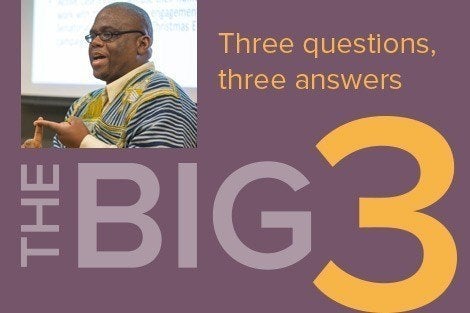March 31, 2015 — Epidemiologist and infectious disease immunologist Mosoka Fallah, MPH ’12, has been on the front lines for many months in his native Liberia battling the Ebola epidemic, which began in December 2013 and spread through several West African countries. He was among the Ebola fighters named Time’s 2014 “Person of the Year.” In an interview at Harvard T.H. Chan School of Public Health, Fallah discussed what he learned during the outbreak and what needs to be done now.
You were dealing with a deadly crisis that exploded in Liberia and other countries in West Africa. How did you deal with the epidemic in its early stages?
I learned about doing contact tracing—finding all of the people whom each Ebola patient came in contact with. We had to have people who would leave no stone unturned. We did training and then retraining. We dismissed people if we had to. It was very stressful. It got better along the way, but it was tough in the beginning.
The emotions were rough. We interviewed moms who’d had all of their children die. We saw pregnant women suffering. I saw one woman give birth in the street to twins because she didn’t have $300 for the private hospital. I talked to a nurse who told me that she cried every night. I had trouble sleeping. All of us who took part in the fight now need some kind of support.
It was just very hard. We worked 8–12 hours a day for seven months. We worked hard, and we’re smart, but I’ll be frank—we’re lucky too. There were variables that, if they had gone wrong, we would not be talking today.
Were there political and cultural issues that presented challenges?
Ebola affects everything—social factors, economics, politics. We had to think about all of that in responding. For example, there was the issue of cremation. Liberia was overrun with dead bodies, and we started cremating them. But because of cremation, a lot of people were hiding the sick and the dead. Cremation is almost unthinkable in Liberia; our burial traditions involve washing the body and touching the dead. But I had to tell top officials that we were not going to succeed in beating Ebola if we didn’t abandon cremation in favor of earth interment of the dead. If you’re going to affect policy, you’ve got to have the ear of some key politicians. Luckily, people listened to me.
What are you most concerned about now?
The Ebola survivors and the Ebola orphans are slipping through the cracks. They’re suffering a lot. Some of the survivors get put out by their landlords. They lose everything. Plus some of them are left with physical and mental impairments from Ebola. Some survivors have gone crazy. As for the orphans, in African culture they normally would live with an aunt or other relative, but if someone already has four mouths to feed, an orphan may wind up back on the street. The boys are not going to go to school and then they’ll be doomed. The girls will become prostitutes. This is an unacceptable situation for our country. I hope it gets better—it’s time to support these people.
photo: Craig LaPlante
